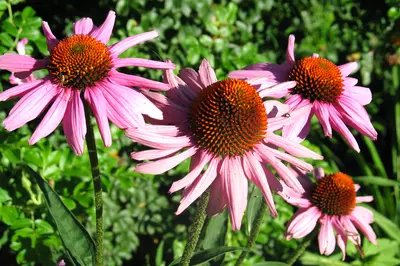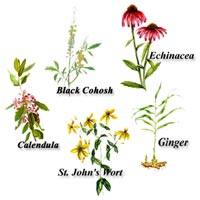Botanical Medicine

Why Do People Use Botanicals?
Americans use botanicals in much the same way they use prescription pharmaceuticals recommended by their physician, or over-the-counter (OTC) medicines available at the local pharmacy-to treat symptoms, prevent disease, and maintain health and wellness.
Who is using botanical medicines?
You are not alone in your interests in botanical medicines. In the U.S., botanical medicines are one of the most popular and rapidly growing of all complementary therapies. In 2010, the global retail sale of botanical dietary supplements amounted to more than $25 billion, according toNutraceuticals World. With this buying power, the more the American public knows about botanicals, the more it can influence good government regulations and reward manufacturers who produce quality products.
Treatment
Although botanical medicines are classified as dietary supplements, not drugs, it is common knowledge that botanical medicines are medicines. As such, Americans use them much like conventional medicines to treat diseases and disease symptoms. For example, women use black cohosh and phytoestrogenic herbs, such as red clover, to treat symptoms of menopause.
There is a considerable amount of scientific and clinical evidence for the use of botanicals. See Is There Good Scientific Evidence? However, manufacturers of dietary supplements cannot, by law, claim that they treat or prevent disease and so cannot provide detailed information on how to use their supplements.
As a result, consumers who wish to use these products in an informed manner must look for outside sources of information, such as the internet. It is important to assess the credibility and accuracy of these sources before making treatment decisions. Who is providing the information? What evidence do they cite? Who is paying for the site? When was the content last updated? These are just a few questions to ask to determine if the site is reliable. For more details see How Do I Get the E-Facts?
Health maintenance and disease prevention
Botanicals are also commonly used to maintain health and prevent disease. There is good research to support these uses:
- Immune-active botanicals, such as echinacea, strengthen and tone immune functions.
- Antioxidant botanicals, such as green tea, prevent cancer, slow aging, and maintain cardiovascular functions.
- Botanicals, such as St. John's wort, alleviate common psychological symptoms, such as insomnia, anxiety, or mild depression. It has also been used in combination with black cohosh to relieve mood symptoms associated with menopause.
- Valerian can also help with insomnia, and kava can help reduce anxiety.
- Botanicals, such as ginger, treat or prevent a variety of gastrointestinal problems, from nausea to constipation.
- Botanicals, such as black cohosh and saw palmetto, treat reproductive system problems, such as menopause and prevention of prostate enlargement.
General Use
Balentine, D.A., Albano, M.C., Muraleedharan. G.N. (1999). Role of medicinal plants, herbs, and spices in protecting human health. Nutrition Reviews, 57 (9), S41-S45.
Barrett, B., Kiefer, D., Rabago, D. (1999). Assessing the risks and benefits of herbal medicine: An overview of scientific evidence. Alternative Therapies, 5(4), 40-49.
Bennett J, B., CM. ( 2000) Use of herbal remedies by patients in a health maintenance organization. Journal of the American Pharmacists Assocociation, 40(3):353-8.
Ernst E. (2003) Herbal medicine for children. Clinical Pediatrics, 42:193-196.
Harnack LJ, DeRosier KL, Rydell SA. (2003) Results of a population-based survey of adult's attitudes and beliefs about herbal products. Journal of the American Pharmaceutical Association, 43:596-601.
Nartey, L., Huwiler-Muntener, K., Shang, A., Liewald, K., Juni, P., Egger, M. (2007). Matched-pair study showed higher quality of placebo-controlled trials in Western phytotherapy than conventional medicine. Journal of Clinical Epidemiology, 60(8), 787-794.
Echinacea
Barrett, B. (2003) Medicinal properties of Echinacea: a critical review. Phytomedicine, 10(1):66-86
Barrett, B., Brown, R., Rakel, D., et al. (2010). Echinacea for treating the common cold: a
randomized trial. Annals of Internal Medicine, 153(2), 769-777.
Block, K.I., Mead, M,N. (2003) Immune system effects of echinacea, ginseng, and astragalus: a review. Integrative Cancer Therapies,
Carr, M.M. Nahata, M. (2006). Complementary and alternative medicine for upperrespiratory-tract infection in children. American Journal of Health-System Pharmacy, 63(1), 33-39.
Dorsch, W. (1996) Clinical application of extracts of Echinacea purpurea or Echinacea pallida. Critical evaluation of controlled clinical studies. Z Arztl Fortbild(Jena), 90(2):117-22.
Islam, J., Carter, R. (2005). Use of echinacea in upper respiratory tract infection.
Southern Medical Journal, 98(3), 311-318.
Linde, K. et al. (2006). Echinacea for preventing and treating the common cold. Cochrane Database of Systematic Reviews, 25(1), CD000530.
Melchart, D., Lindem K., Fischer, P., Kaesmayr, J. (2000) Echinacea for preventing and treating the common cold. Cochrane Database (CD000530).
Miller, S. C. (2005). Echinacea: A miracle herb against aging and cancer? Evidence in
vivo in mice. Evidence Based Complementary Alternative Medicine, 2(3), 309.
Shah, Sacchin A., Sander, Stephen, White, Michael C., Rinaldi, Mike, Coleman, Craig I. (2007). Evaluation of echinacea for the prevention and treatment of the common cold: A meta-analysis. The Lancet Infectious Diseases, 7(9), 580.
Yale, S.H., Liu, K. (2004). Echinacea purpurea therapy for the treatment of the common
cold: a randomized, double-blind, placebo-controlled clinical trial. Archives of Internal
Medicine, 164(11), 1237-1241.
Green Tea
Chantre P, Lairon, D. (2002) Recent findings of green tea extract AR25 (Exolise) and its activity for the treatment of obesity. Phytomedicine, 9(1):3-8.
Cooper, R., Morre, J., Morre, D. (2005). Medicinal benefits of green tea: Part I. Review of noncancer health benefits. Journal of Alternative Complementary Medicine, 11(3), 521-528.
Cooper, R., Morre, J., Morre, D. (2005). Medicinal benefits of green tea: Part II. Review of anticancer properties. Journal of Alternative Complementary Medicine, 11(4), 639-652.
Hakim, I.A., Harris, R.B., Brown, S., Chow, H.H., Wiseman, S., Agarwal, S., Talbot, W. (2003) Effect of increased tea consumption on oxidative DNA damage among smokers: a randomized controlled study. Journal of Nutrition, 133(10):3303S-3309S.
St. John's Wort
Barnes, J., Barber, N., Wheatley, D., Williamson, E.M. (2006). A pilot randomised, open,
uncontrolled, clinical study of two dosages of St John's wort (Hypericum perforatum)
herb extract (LI-160) as an aid to motivational/behavioural support in smoking cessation.
Planta Medica, 72(4), 378-82.
Brattstrom, A. (2009). Long-term effects of St. John's wort (hypericum perforatum)
treatment: a 1-year safety study in mild to moderate depression. Phytomedicine, 16(4),
277-283.
Briese, V., Stammwitz, U., Friede, M., Henneicke-von, Zepelin, H.H. (2007). Black cohosh with or without St. John's wort for symptom-specific climacteric treatment-results of a large-scale, controlled, observational study. Maturitas, 57(4), 405.
Butterweck V. (2003). Mechanism of action of St John's wort in depression: What is
known? CNS Drugs, 17(8), 539-562.
Clement, K., Covertson, C.R., Johnson, M.J., Dearing, K. (2006). St. John's wort and the
treatment of mild to moderate depression: a systematic review. Holistic Nursing Practice,
20(4), 197-203.
Izzo, A.A. (2004). Drug interactions with St. John's Wort (Hypericum perforatum), a review of the clinical evidence. International Journal of Clinical Pharmacological Therapy, 42(3), 139-148.
Linde, K., Ramirez, G., Mulrow, C.D., Pauls, A., Weidenhammer, W. and Melchart, D. (1996). St. John's wort for depression-an overview and meta-analysis of randomized clinical trials. British Medical Journal, 313, 253-258.
Kasper, S., Anghelescu, I.G., Szegedi, A., Dienel, A., Kieser, M. (2006). Superior
efficacy of St. John's wort extract WS 5570 compared to placebo in patients with major
depression: a randomized, double-blind, placebo-controlled, multi-center trial. BMC
Med., 23(4), 14.
Kasper, S., Caraci, F., Forti, B., Drago, F., Aguglia, E. (2010). Efficacy and tolerability
of Hypericum extract for the treatment of mild to moderate depression. European
Neuropsychopharmacology, 20(11), 747-765.
Lawyere, S., Mahoney, M.C., Cummings, K.M., Kepner, J.L, et al. (2006). A Phase II
study of St. John's wort for smoking cessation. Complementary Therapy Medicine, 14(3),
175.
Linde, K. (2009). St. John's wort - an overview. Forsch Komplementmed, 16(3), 146-155.
Linde, K., Berner, M.M., Kriston, L. (2008). St John's wort for major depression.
Cochrane Database of Systematic Reviews, (4), CD000448.
Madabushi, R., Frank, B., Drewelow, B., Derendorf, H., Butterweck,V. (2006). Hyperforin in St. John's wort drug interactions. European Journal of Clinical Pharmacology, 63(2), 225.
Mannel, M. (2004). Drug interactions with St John's wort: Mechanisms and clinical
implications. Drug Safety, 27(11), 773-97.
Mannel, M., Kuhn, U., Schmidt, U., Ploch, M., Murck, H. (2010). St. John's wort extract
LI160 for the treatment of depression with atypical features - a double-blind, randomized,
and placebo-controlled trial. Journal of Psychiatric Research, 44(12), 760-767.
Müller, W.E. (2003). Current St John's wort research from mode of action to clinical
efficacy. Pharmacol Res., 47(2), 101-109.
Parsons, A., Ingram, J., Inglis, J., et al. (2009). A proof of concept randomised placebo
controlled factorial trial to examine the efficacy of St John's wort for smoking cessation
and chromium to prevent weight gain on smoking cessation. Drug and Alcohol
Dependence, 102(1-3), 116-122.
Pilkington, K., Boshnakova, A., Richardson, J. (2006). St John's wort for depression:
Time for a different perspective? Complementary Therapies in Medicine, 14(4), 268-81.
Rahimi, R., Nikfar, S., Abdollahi, M. (2009). Efficacy and tolerability of Hypericum
perforatum in major depressive disorder in comparison with selective serotonin reuptake
inhibitors: a meta-analysis. Progress in Neuropsychopharmacology and Biological
Psychiatry, 33, 118-127.
Ranlov, C., Mehlsen, J., Thomsen, C.F., Hedman, C., von Fircks, H., Winther, K. (2006). The efficacy of St. John's wort in patients with minor depressive symptoms or dysthymia-a double-blind placebo-controlled study. Phytomedicine, 13(4), 215.
Uzbay, T.I. (2008). Hypericum perforatum and substance dependence: a review.
Phytother Res., 22(5), 578-582.
Ginger
Boone, S., Shields, K. (2005). Treating pregnancy-related nausea and vomiting with ginger. Annals of Pharmacotherapy, 39, 1710-1713.
Ernst, E. and Pittler, M.H. (2000). Efficacy of ginger for nausea and vomiting: A systematic review of randomized clinical trials. British Journal of Anesthesia, 84(3), 367-371.
Black Cohosh, Saw Palmetto
Agbabiaka, T.B., Pittler, M.H., Wider, B., Ernst, E. (2009) Serenoa repends (saw
palmetto): a systematic review of adverse events. Drug Saf. 32(8): 637-47. doi:
10.2165/00002018-200932080-00003. Review. PubMed PMID: 19591529.
Avins, A. L., & Bent, S. (2006). Saw palmetto and lower urinary tract symptoms: What is the latest evidence? Current Urology Rep., 7(4), 260.
Bent, S. et al. (2006). Saw palmetto for benign prostatic hyperplasia. New England
Journal of Medicine, 354(6), 557-566.
Boyle, P., Robertson, C., Lowe, F., Roehrborn, C. (2004). Updated meta-analysis of
clinical trials of Serenoa repens extract in the treatment of symptomatic benign prostatic
hyperplasia. British Journal of Urology International, 93(6), 751-756.
Briese, V., Stammwitz, U., Friede, M., Henneicke-von, Zepelin, H.H. (2007). Black cohosh with or without St. John's wort for symptom-specific climacteric treatment-results of a large-scale, controlled, observational study. Maturitas, 57(4), 405.
Buck, A.C. (2004). Is there a scientific basis for the therapeutic effects of Serenoa repens
inbenign prostatic hyperplasia? Mechanisms of action. Journal of Urology, 172(5 Pt 1),
1792-1799.
Chung, DJ, Kim, HY, et al. (2007). Black cohosh and St. John's wort for climacteric symptoms. Yonsei Medical Journal, 48(2), 289.
Fong, Y.K., Milani, S., Djavan, B. (2005). Role of phytotherapy in men with lower
urinary tract symptoms. Current Opinion in Urology, 15(1), 45-48.
Geavlete, P., Multescu, R., Geavlete, B. (2010). Serenoa repens and benign prostatic
hyperplasia: no more effective than placebo. Prescrire Int., Aug; 19(108): 181-2. Review.
PubMed PMID: 20941857.
Geller SE, Studee L. (2005). Botanical and dietary supplements for menopausal symptoms: What works, what does not. Journal of Women's Health. 14(7), 634-649.
Haimov-Kochman R, Hochner-Celnikier D. (2005). Hot flashes revisited: pharmacological and herbal options for hot flashes management. What does the evidence tell us? Acta Obstet Gynecol Scand. 84(10), 972-979.
Hudson, T. (2006). Black cohosh update. Does it work? Is it hepatotoxic? Alternative Complementary Therapy, June, 132-135.
Li, J.X., Yu, Z.Y. (2006). Cimicifugae rhizoma: from origins, bioactive constituents to clinical outcomes. Current Medical Chemistry, 13(24), 2927-51.
Lieberman, S. (1998). A review of the effectiveness of Cimicifuga racemosa (black cohosh) for the symptoms of menopause. Journal of Women's Health, 7(5), 525-529.
Mahady, G.B., Fabricant, D., Chadwick, L.R., Dietz, B. (2002). Black cohosh: An alternative therapy for menopause? Nutrition in Clinical Care, 5(6),283-9.
Osmers, R., Friede, M., Liske, E., et al. (2005). Efficacy and safety of isopropanolic black cohosh extract for climacteric symptoms. Obstetrics and Gynecology, 105, 1074-1083.
Suzuki, M., Ito, Y., Fujino, T., Abe, M., et al. (2009). Pharmacological effects of saw
palmetto extract in the lower urinary tract. Acta Pharmacol Sin., 30(3), 227-81.
Tacklind, J., MacDonald, R., Rutks, I., Wilt, T.J. (2009). Serenoa repens for benign
prostatic hyperplasia. Cochrane Database Syst Rev. (2): CD001423.
Taylor, M. (2003). Alternatives to HRT: An evidence-based review. International Journal of Fertility & Women's Medicine, 48(2), 64-8.
Ulbricht, C., Basch, E., Bent, S., Boon, H., Corrado, M., Foppa, I., Hashmi, S., Hammerness, P., Kingsbury, E., Smith, M., Szapary, P., Vora, M., Weissner, W. (2006). Evidence-based systematic review of saw palmetto by the Natural Standard Research Collaboration. Journal of the Society for Integrative Oncology, 4(4), 170-86.
Wadsworth, T.L., Worstell, T.R., Greenberg, N.M., Roselli, C.E. (2007). Effects of
dietary saw palmetto on the prostate of transgenic adenocarcinoma of the mouse prostate
model (TRAMP). Prostate, 67(6), 661-73.
Wilt, T., Ishani, A., Mac Donald, R. (2002) Serenoa repens for benign prostatic hyperplasia. Cochrane Database (CD001423). 2(3):247-67. 5(6):283-9.



